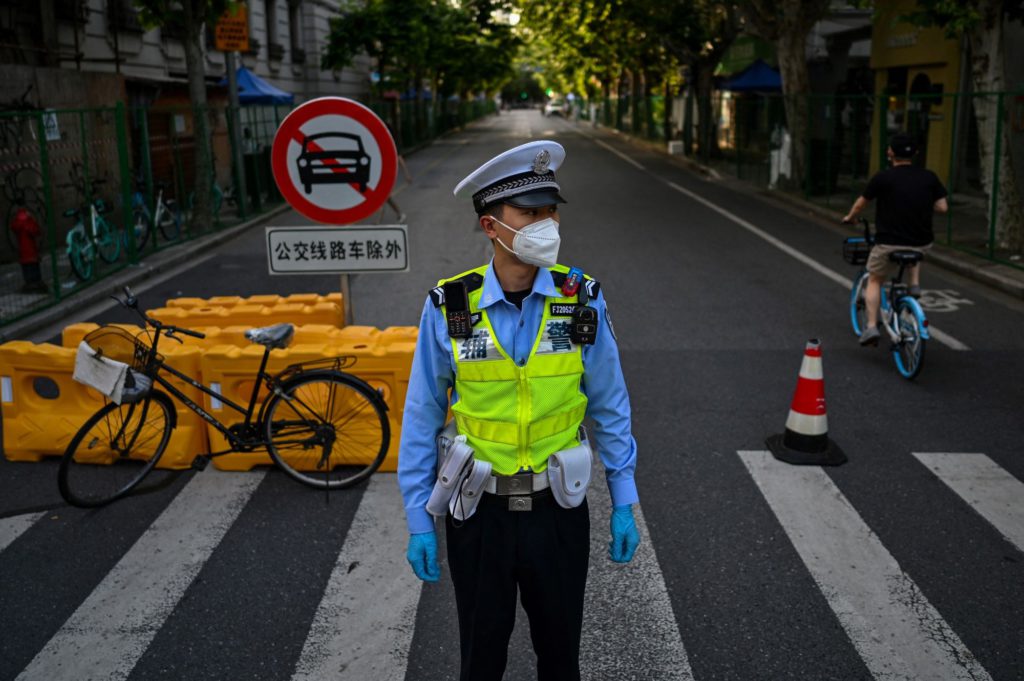(Bloomberg) — Shanghai will lock down seven districts this weekend to conduct mass Covid-19 testing drives, its first major movement restrictions since the financial hub exited a bruising two-month shutdown at the start of June.
The temporary lockdown, which will cover millions of people across the Pudong, Huangpu, Jing’an, Xuhui, Hongkou, Baoshan and Minhang districts, comes as infections found in the community rebounded to six as of 5 p.m. on Thursday, up from zero the day before.
Four of the six cases were found in Minhang, a district of 2.65 million in the south west of Shanghai. Minhang will be sealed on Saturday morning for mass testing, said a local statement, while the other districts didn’t specify how long their lockdowns would last.
The moves are raising concerns that the city’s reopening is backsliding as officials fear a resurgence of infection after social and economic activity resumed. Residents face the risk of being confined to their homes for another two weeks if any Covid infections are discovered during mass testing, in line with China’s Covid Zero policy.
The government also appears to be escalating curbs and placing apartment blocks back under lockdown over the slightest hint of infection risk. Some housing compounds in the central Jing’an and Xuhui districts were sealed for 14 days from Tuesday, although only close contacts – no confirmed cases – were found among residents.
The threat of renewed restrictions is looming over all of Shanghai as the city tentatively emerges from the lockdown implemented in late March. While most residents have regained their freedom since the start of June, millions are still grappling with varying limitations and the abrupt imposition of new curbs.
The constant risk of resurgence and the measures needed to prevent them underscores the stress stemming from the zero-tolerance strategy still followed in the world’s most populous country. In the capital Beijing, which has been struggling with a long but low-level flareup, authorities ordered the tightening of rules again after a bar cluster ended a five-day streak of zero community spread.
Mass testing resumed Thursday in several neighborhoods in Beijing’s eastern Chaoyang district, known for its skyscrapers and glistening retail outlets, while entertainment venues like internet cafes and karaoke parlors were closed, with more inspections planned city-wide.
“The risk of Covid’s covert spread remains and it sounds an alarm once again that our epidemic control and prevention must not have an iota of relaxation,” said Xu Hejian, a spokesman for the Beijing municipal government at a briefing on Thursday.
Experts See China Stuck in a Slowly Evolving Covid-Zero Loop
Nationwide, China reported 164 infections for Wednesday, including nine in Shanghai. Most of the country’s cases were in Inner Mongolia, in China’s north, where the number rose to 130 from 81 the previous day and some areas remain locked down.
China Fears Wind Is Blowing Covid Virus in From North Korea
Even before mass testing drives, people in some affected areas in Shanghai’s Xuhui and Jing’an districts have been barred from leaving their homes and are subject to a daily Covid test, according to the latest policy. Others will be quarantined for seven days, followed by another week of health monitoring at home. During the control period, all vehicles in regions except for buses and ambulance are banned, according to government statements.
While the vigilance in China’s mega-cities escalated, national health leaders are trying to rein in some over-zealous efforts to root out the virus in smaller, less economically important places.
Not every city in China needs to do regular Covid mass testing, and results shouldn’t always be required for riding public transportation and entering public venues, officials at China’s National Health Commission said on Thursday. Testing should focus on people with high risk exposure and those in places with outbreaks, said He Qinghua, an official from the National Health Commission.
(Adds new developments throughout)
More stories like this are available on bloomberg.com
©2022 Bloomberg L.P.











